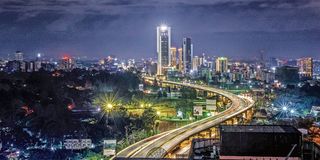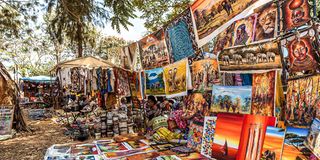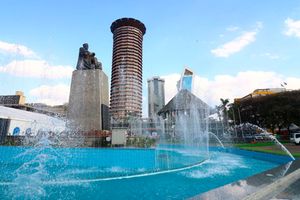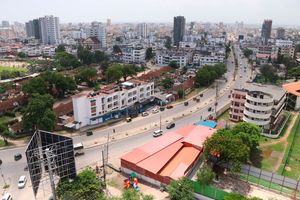
Nairobi skyline on December 31,2023 as Kenyans ushered in the New Year.
Every new year, people set goals for travel or are posted to new workstations, including Nairobi.
So how do first-time visitors to Kenya view the country's capital city?
The Lonely Planet, one of the renowned travel publications, recently ranked it top in the list of the best cities, beating the romantic and timeless Paris and the vibrant Montreal.
What’s more exciting is the fact that it was the only African city that made it to the list, beating great cities like Cairo, Casablanca and Johannesburg because of its vibrant culture, stunning scenery as well and wildlife safaris.
Before coming to Nairobi, Dale Hes, a South African who lives in Johannesburg, expected it to be something similar to where he resides: a mix between modern urban areas, more traditionally African areas and the general hustle and bustle of a big city.
“In general, these views proved to be right, although the city has its own unique character and interesting things you would never see in South African cities,” Dale says.
He adds that what shocks him about being in Nairobi is the traffic jams which he believes is on another level compared to Jo'burg.
“I thought traffic was bad in Jo'burg but Nairobi is on another level! It's not only about the number of vehicles on the road but also that everyone just seems to drive exactly how they want to. 'Normal' rules of the road don't apply. If you don't drive aggressively in Nairobi then you're going to be stuck for hours,” he says.
He was also shocked by the boda bodas and was surprised to open his Uber app and find them listed on the app. The colourful matatus roaring around the streets were also quite an interesting sight and he felt disappointed that he didn’t manage to take one drive to a destination in them.
“I was also surprised at how strict the smoking laws are. In South Africa, you can pretty much smoke anywhere outside, but Nairobi only has small and specific areas where you can smoke. I was also pleasantly surprised by the weather. I was expecting it to be extremely hot but because Nairobi is at a higher elevation it remains quite cool,” he adds.
Friendlier and more welcoming

An art display in Nairobi, Maasai Market.
One thing he noted too was how Kenyans are friendlier and more welcoming to visitors compared to South Africans.
“I felt very safe and everyone I spoke to said Nairobi is a safe city. In South Africa we would admit to you that crime is a problem and you always need to be aware. The food was so tasty, with so much variety and a lot of locally produced and traditional foods available. The city centre was so clean! We often have a lot of rubbish in our public areas, especially in Jo'burg,” recalls Dale.
Though he did not have much time to explore tourist attractions within the city, he was a bit disappointed with the National Museum which he feels has been badly maintained and in dire need of a facelift.
“The prices for tourists from outside the EAC are expensive compared to South Africa. To get into the museum I paid six times what an EAC citizen would pay. The airport isn't in the best state compared to South African airports. Domestic departures when we flew to Malindi were especially overcrowded,” he laments.
He believes that for a touristic experience, Nairobi can be significantly improved in terms of investment in infrastructure.
“But overall, the city had all the ingredients of cultural, heritage, social and urban attractions that would make it a fascinating destination for any tourist and a 'must-visit' amongst African cities,” he notes.
Eliane Irakoze, who resides in Kigali, Rwanda was quite nervous when she heard that she would be traveling to Nairobi for the first time.

Eliane Irakoze, a Rwandese who resides in Kigali during her first-time visit to Nairobi.
“I have heard stories about Nairobi not being safe and visiting for the first time, so I was cautious at first,” she says.
What shocked her the most as she was touring the city was seeing street vendors and people cooking on the side of the road.
Top-notch hospitality
“Kigali is clean, organised and it’s very safe to walk with your belongings. I was also shocked at how big the city is compared to Kigali and the beautiful, tall buildings were one of my highlights. The hospitality in the hotels was also another highlight as I found it to be top-notch,” she adds.
Sam Kabyesiza or Jungleman who resides in Kampala, Uganda was shocked to see the well-planned infrastructure and just like in Kampala, the congestion of people on the streets.
“Kampala is not so well organised when you look at city settlement standards. Some of the residential areas have no plan at all and access to a home in these areas may be a pain. Nairobi on the other hand is a bit more organised. There are plenty of organised estates complete with proper housing patterns so you're not likely to get lost looking for your own house in the first week you move there. Rent depends on the area you settle in, but it's generally affordable and convenient,” he explains.

Sam Kabyesiza who resides in Kampala, Uganda, during his first visit to Nairobi.
But when it comes to food, Sam believes that Kampala is a haven for fresh food and general wares that are quite cheap.
“Nairobi on the other hand is properly adorned with convenient stores on every street, road and highway. Each of these serves a different kind of economic class of people so whom they serve will dictate their prices, except for the price of general wares. There's a fresh food market almost every four kilometres in any direction you take and food is always available. There's a supermarket quite close to you,” he continues.
Sam also believes that while Kampala is an active business and administrative city just like Nairobi, employment opportunities are not as readily available as it is over here.
“Nairobi is a hustler's paradise. Where jobs may not be in plenty, entrepreneurship is on the rise. The young are sharp and tech-savvy and are making their employment opportunities which in turn creates employment for many other youth. Hence Nairobi is just a bit easier to thrive in economically compared to Kampala,” adds Sam.
Good infrastructure
He adds that when it comes to crime, Kampala has a good crime prevention rate compared to Nairobi and it's generally a safe place to live in.
“Nairobi is wanting in terms of crime. One has to be alert all the time or else you lose your valuables.”
When it comes to similarities, Sam believes that there are many of them. For instance, both cities have a hyperactive social life and a very intriguing nightlife and both don't disappoint. They also have great access to good internet and telecommunication services. While Kampala has more in number, Nairobi has the better efficient ones.

Wildlife at the Nairobi National Park.
He believes that Nairobi deserves the title by Lonely Planet being that it’s one of the top places to visit for every traveller and the infrastructure that’s in place.
“True Nairobi is one of the top places to be in whether one's intentions for travel is for money, romance, peace, curiosity, discovery, study, spiritual activities, betterment of life, pleasures because it's gifted by nature, culture, history, language, safety, infrastructure, nightlife, freedom, romance, technology, connecting flights. Nairobi has everything that a traveller needs in one plate,” he says.
“Both cities have made sure their health facilities are of international standards so treatment for ailments is easy and quick. The insurance and banking sector is growing daily in both cities so it's in your favour to engage these services for your financial well-being. Both cities have a society that is very welcoming and friendly so it's easy to make friends and survive. It's a plus they consider each other as good neighbours (speaking of both countries),” Sam explains.
Jean de Dieu Nahimana who resides in Bujumbura already knew that Nairobi is one of the developed countries in the sub-region.
“Personally, as a national of Burundi, the difference is observable even at the airport. The reception, the organisation in general everything is in order. The infrastructure is also tops. Only the food bothered me a little during the first days but with time I ended up getting used to it. The welcome is also a positive aspect that cannot be ignored. I also loved the hospitality and the service at the hotels and I believe Nairobi is a model in promoting tourism within the sub-region,” he says.
Nahimana says his first time in the city has inspired him to create awareness in his city Bujumbura to change how some things are done.









